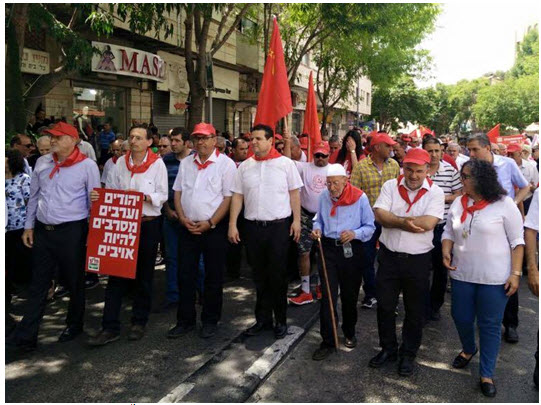Prime Minister Benjamin Netanyahu and Labor leader MK Isaac Herzog reportedly met for several hours Sunday night, May 15, to discuss bringing the Zionist Union into the far-right government, but according to a Channel 2 report broadcast on Monday, no progress was made in the behind closed-doors talks. Meanwhile, several polls released on Monday indicated that public support for the Zionist Union is plummeting.

Leaders of Hadash and the Communist Party of Israel (CPI) among the marchers in the May Day parade which was held in Nazareth on April 30. In the first row, from left to right: Issam Makhoul, head of the Emil Touma Institute for Palestinian and Israeli Studies; MK Dov Khenin (holding sign); CPI General Secretary Adel Amer; MK Ayman Odeh, head of the Joint List; from the right: MK Aida Touma-Sliman and MK Yousef Jabareen (Photo: Al Ittihad)
In recent weeks rumors have been circulating about talks between Netanyahu and Herzog aimed at creating a unity government. Herzog has so far rejected Netanyahu’s reported overtures, but has left the door open for joining the government, angering several members of his own party. Last week, Netanyahu confirmed that the Likud and Zionist Union had been in the advanced stages of talks on a new unity government, but those discussions ended after it was revealed last month that Herzog was under investigation for campaign finance issues. Netanyahu’s government currently has the slimmest possible Knesset majority of just 61 to 59 MKs. The Zionist Union has 24 MKs, 19 of whom are members of Herzog’s Labor Party while five belong to HaTnua, led by Tzipi Livni.
MK Ayman Odeh (Hadash), chairman of the Joint List bloc, gave vent to particularly harsh criticism of Herzog’s negotiations with the far-right PM: “Herzog is not relevant, he’s not a leader and should have resigned as head of the opposition a long time ago. He has turned himself into a cheap and pale imitation of Netanyahu…. Especially during difficult times like these, when a real, bold alternative to the government of Netanyahu and the right should be presented, an alternative that offers a just peace, equality and democracy, and of a shared fight for the future of us all,” said Odeh, leader of Israel’s sole Arab-Jewish fraction in the Israel’s parliament. According to the Communist weekly Zu Haderech, “Herzog is doing the dirty work for the coalition, and is being dragged by his hair by the far-right PM Benjamin Netanyhau.” The Hebrew-language Communist weekly slammed Herzog “for playing into Netanyahu’s hands, like a puppet.”
Two separate polls released by major Israeli networks revealed on Monday, May 16, that most Israelis are staunchly opposed to a Likud-Zionist Union unity government. Furthermore, if Knesset elections were held today, both parties would face significant losses. The first poll, conducted for Channel 2, indicates that 52% of Israeli oppose the suggested unity government, while just 24% support it. From among Zionist Union voters, 60% of are against a unity government with the Likud, as opposed to 36% who support such a move. According to this same poll, if elections were held now (May 2016), the Likud would win 27 seats in the Knesset (a loss of 3 MKs compared to its current 30); Yesh Atid, would win 7 additional seats reaching a total of 18; the Zionist Union would lose 7 seats, dropping to 17; and the Joint List would gain one MK, rising from 13 to 14 seats.
The second poll, conducted for Channel 10, predicts far more dramatic results: The Likud would lose 5 seats, dropping to 25; Yesh Atid would gain 9 seats, increasing its representatives to 20; the number of MKs for the Zionist Union would fall to 13, losing nearly half of its current 24; and the Joint List here too would gain one seat, reaching 14. When questioned during this second poll, 50% of respondents said that they are against Zionist Union ‘s joining the government; 26% support the move; and 24% said that they have no opinion.


